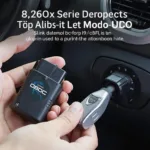A clogged engine filter can indirectly impact your ability to pass an OBD2 test. While the OBD2 system doesn’t directly monitor the filter’s condition, a severely restricted filter can trigger other issues that the OBD2 system will detect, potentially leading to a failed emissions test. Let’s delve deeper into this connection.
How Engine Filters Affect OBD2 Readings
While the OBD2 system doesn’t directly measure filter restriction, a clogged filter can cause a chain reaction that triggers fault codes.
For example, a clogged air filter restricts airflow to the engine, disrupting the optimal air/fuel mixture. This can lead to a rich mixture (too much fuel), triggering codes like P0172 (System Too Rich Bank 1) or P0175 (System Too Rich Bank 2). Similarly, a restricted fuel filter can starve the engine of fuel, leading to a lean mixture and codes like P0171 (System Too Lean Bank 1) or P0174 (System Too Lean Bank 2). These codes illuminate the check engine light and will cause you to fail an OBD2 test.
Understanding the OBD2 System
The OBD2 system is designed to monitor the emissions control system and other critical engine components. It doesn’t specifically check the filters themselves, but rather the effects of a clogged filter on the engine’s performance and emissions. car obd2 codes
Will a slightly dirty filter cause problems? Probably not. A slightly dirty filter might slightly reduce performance, but it’s unlikely to trigger fault codes immediately. However, it’s important to replace filters according to the manufacturer’s recommendations to prevent future issues.
The Role of Different Filters
Different filters play distinct roles, and their impact on OBD2 readings varies:
- Air Filter: A clogged air filter affects the air/fuel mixture, potentially leading to rich mixture fault codes.
- Fuel Filter: A restricted fuel filter can cause a lean mixture, triggering corresponding fault codes.
- Oil Filter: While crucial for engine lubrication, a clogged oil filter doesn’t typically directly impact OBD2 readings. However, long-term neglect can lead to catastrophic engine failure, indirectly affecting emissions.
Troubleshooting Filter-Related OBD2 Issues
If you suspect a clogged filter is causing OBD2 issues, follow these steps:
- Check the Check Engine Light: A lit check engine light is the first indicator of an OBD2 problem.
- Retrieve the Fault Codes: Use an OBD2 scanner to retrieve the specific fault codes.
- Inspect the Filters: Visually inspect the air and fuel filters for signs of clogging or excessive dirt.
- Replace the Filters: Replace any dirty or clogged filters.
- Clear the Codes: After replacing the filters, clear the fault codes using the OBD2 scanner.
- Retest: Drive the vehicle for a while to allow the OBD2 system to complete its monitors. If the check engine light remains off, the issue is likely resolved.
“Regular filter maintenance is essential for optimal engine performance and passing emissions tests,” says John Smith, ASE Certified Master Technician. “Ignoring clogged filters can lead to more serious and costly repairs down the road.”
Can You Pass With a Clogged Filter?
You might pass an OBD2 test with a slightly dirty filter if it hasn’t triggered any fault codes yet. However, it’s a gamble. A severely clogged filter will almost certainly cause issues that will lead to a failed test. can you get around a obd2 in a diesel smog
“Don’t wait until your check engine light comes on to address filter maintenance,” advises Jane Doe, Senior Automotive Engineer. “Preventive maintenance is always cheaper than reactive repairs.”
Conclusion
While a clogged engine filter doesn’t directly cause an OBD2 test failure, it can trigger other problems that the OBD2 system will detect. Regular filter maintenance is crucial not only for passing emissions tests but also for overall engine health and performance. Addressing potential filter issues proactively can save you time, money, and frustration in the long run.
FAQ
- Can I clean my air filter instead of replacing it? While some air filters are designed to be cleaned, most are disposable and should be replaced.
- How often should I change my fuel filter? Consult your vehicle’s owner’s manual for the recommended fuel filter replacement interval.
- What are the symptoms of a clogged air filter? Symptoms include reduced engine performance, rough idling, and decreased fuel efficiency.
- Can a clogged fuel filter damage my engine? Yes, a severely clogged fuel filter can damage the fuel pump and other engine components.
- How much does it cost to replace an air filter? Air filter replacement is relatively inexpensive, typically costing between $20 and $50.
- How much does it cost to replace a fuel filter? Fuel filter replacement costs vary depending on the vehicle, but typically range from $50 to $150.
- Can I replace my engine filters myself? Replacing air and fuel filters is often a straightforward DIY task. Consult your owner’s manual or online resources for guidance.
Need help? Contact us via WhatsApp: +1(641)206-8880, Email: [email protected] or visit us at 789 Elm Street, San Francisco, CA 94102, USA. We have a 24/7 customer support team.
